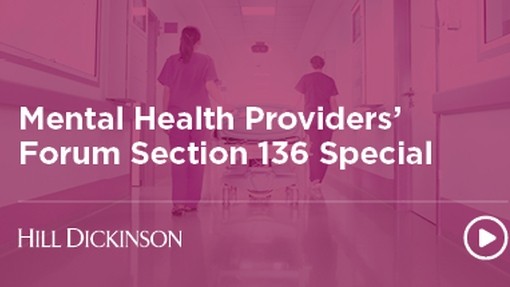The Future of Deprivation of Liberty

The Future of Deprivation of Liberty
The government announced in April 2023, that the Liberty Protection Safeguards (LPS) (initially passed within the Mental Capacity Amendment Act 2019) will not be implemented in the foreseeable future. We must ask ourselves what next for the future of Deprivation of Liberty. This question is a fitting one as we reflect on the 10 year anniversary of the Supreme Court decision in Cheshire West.
The Care Quality Commission’s (CQC) State of Care report on Deprivation of Liberty Safeguards (DoLS), published in October 2023, highlights several ongoing issues in the care system that have left vulnerable individuals without legal protection for extended periods of time. The report recognises that the delay in implementing LPS means that challenges will likely continue.
Main takeaways from reviewing the report are that DoLS applications are increasing year by year: in 2022/23, the number of DoLS applications increased to over 300,000 (an 11% on year increase), with only 19% of standard applications completed within the statutory 21-day timeframe. The report highlights the concern of CQC that the current system is unable to cope with the demand for authorisations. A primary illustration of this is the some 39,000 individuals that had reportedly been waiting for longer than a year for their DoLS applications to be completed as at March 2023. The impact is that vulnerable adults will remain without DoLS authorisation or legal protection for extended periods of time.
This data solely relates to those authorisations made under the DoLS scheme. NHS and Local Authority commissioners continue to make large numbers of COPDOL11 applications to the Court of Protection for authorisation of those deprivations of liberty occurring in the community, for example, an ‘own home’ deprivation of liberty that falls outside of the statutory DoLS scheme. With an aging population, amongst other things, this is likely to continue.
The lack of a streamlined legal framework for the deprivation of liberty of 16 and 17 year olds, that was intended to be simplified by LPS, continues to give rise to increasing issues, in particular those faced by the court and those commissioning the care packages that meet the ‘acid test’.
At this point in time, and before the next UK general election, the future of deprivation of liberty authorisations overall are unfortunately unclear. It seems likely that the LPS will not come into effect for at least another few years and there has been no indication that the implementation of LPS will be a parliamentary priority for any incoming government. This puts ever more pressure on the courts and public services.
In the absence of legislative reform, the following should be a priority:
- Clarity on the updated code of practice relating to the Mental Capacity Act more generally
- Filling the gap for 16 and 17 year olds
- Adequate resources for the whole system
- Reducing the burden of COPDOL11 applications in the community on the courts.
On point four, it is important to highlight a recent decision of the High Court (family division) surrounding the deprivation of liberty of a 12-year-old girl (Peterborough City Council -v- Mother (Re SM) [2024] EWHC 493 (Fam)). Mrs Justice Lieven, in her judgment, referred to a ‘mission creep’ in deprivation of liberty applications to the High Court, and that in particular this case extended the decision in Cheshire West ‘to a logical but extreme conclusion that, in my view, defies common sense and is not required by the terms of the Supreme Court decision.’
To give this context, it was held by the Court of Appeal in Re D (A Child) [2017] EWCA Civ 1695 that the deprivation of liberty of a child aged 10 to 16 who is lacking in ‘Gillick competence’ can be authorised by an individual with parental responsibility for said child. What complicates this is when a local authority is involved in the care of that child, as it is unable to consent to a deprivation of liberty in the way an individual with parental responsibility can. In this vein, in the case of SM, an application was brought by the local authority as SM was living in foster care and a final care order had been made.
No doubt the local authority had the Judgement of Re A-F [2018] EWHC 138 (Fam) in mind when bringing the application, which set out a ‘rule of thumb’ when dealing with younger children and ‘confinement’. That judgment gave somewhat of a blueprint for those aged 10 and above but stated in broad terms that once a child who is under constant supervision has reached the age of 12, the court will more readily come to the conclusion that the threshold for confinement is met (depending on the factual matrix of the case). If a child is confined, and no person with true parental responsibility can give consent on their behalf (including where the child is subject to a care order or is in foster care) an application to the High Court under its inherent jurisdiction will be required.
However, in SM, Mrs Justice Lieven considered that many of the restrictions were part of SM’s care provision and not actions that deprive SM of her liberty. For clarity, it was said that SM was not free to leave her foster care placement because of her physical and mental disabilities and not due to restraint placed or enforced upon her by the local authority. Therefore, there wasn’t a deprivation of liberty arising by definition of the test set out in Cheshire West. This case was said to differ from Cheshire West, which focused on the prevention of the three individuals at the centre of the case, from leaving their homes if they had tried to.
The area of deprivation of liberty of children and young people can be quite complex, whereas that of adults was seemingly simplified by the judgment of Cheshire West and subsequent case law, which had already considered such a position. We wonder, however, in light of this Judgment by Mrs Justice Lieven and the comments made within, whether more judges will take a similar position in future deprivation of liberty cases, particularly for adults.
It is certainly not unheard of for deprivation of liberty authorisations to be sought and indeed authorised for individuals who have similar care packages to that of SM in the community. It may be in future that further scrutiny is given by Judge’s reviewing COPDOL11 applications for authorisations in the community, together with local authorities and NHS commissioners, as to whether a package of care does in fact meet the ‘acid test’. Will this be a method of reducing the burden of COPDOL11 applications on the court? As yet that remains to be seen, but further case law and guidance from the Court of Protection would be helpful on this point, particularly in the absence of parliamentary priority. In the meantime, until there is further guidance or authority from a higher court, COPDOL11 applications should continue to be brought as normal.
This article was co-authored by Shannon Coyle.






